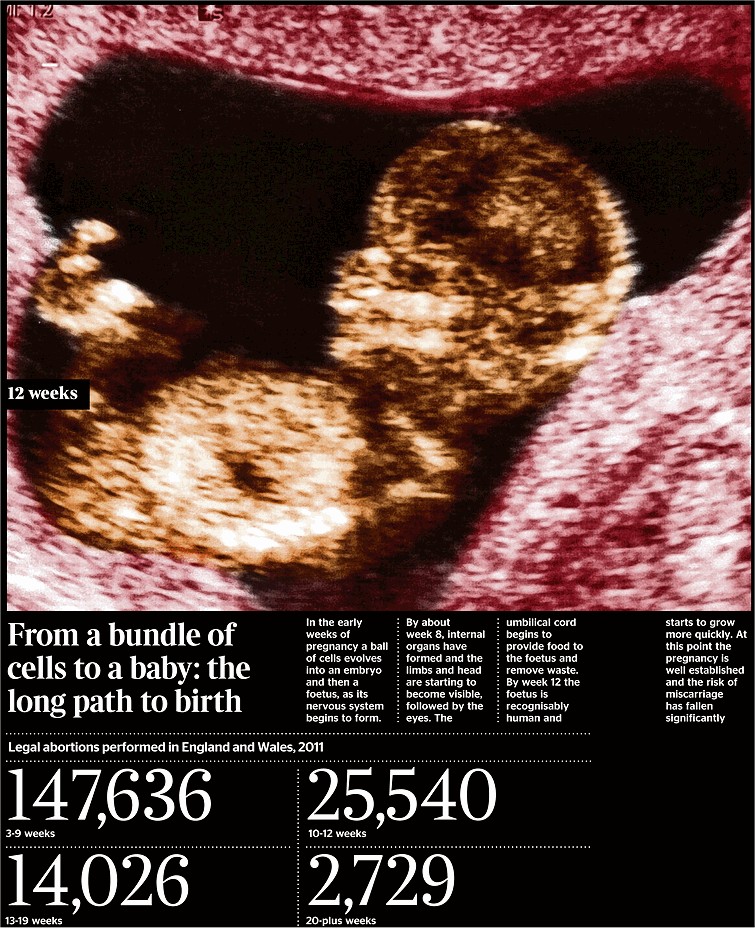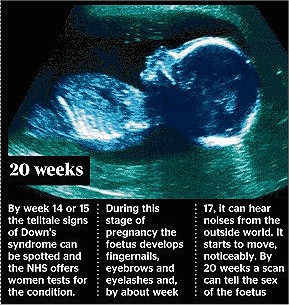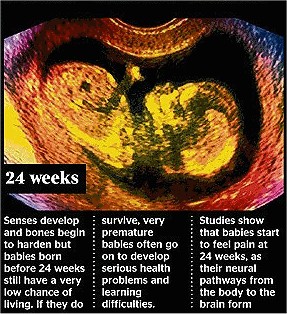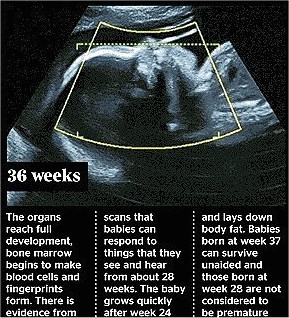
|

 |
|
Jeremy Hunt, the new Health Secretary, backs a reduction in the time limit for women to have abortions, from 24 to 12 weeks.
Speaking to The Times on the eve of Conservative Party conference, Mr Hunt said he had reached the conclusion after studying the evidence and denied that his stance was a consequence of his Christian belief. Acknowledging that it was an “incredibly difficult question”, he rejected arguments from those wanting abortion to be illegal and stressed that the Government had no plans to change the law.
But he made clear his view that the legal limit for abortion should be significantly reduced. “Everyone looks at the evidence and comes to a view about when they think that moment is, and my own view is that 12 weeks is the right point for it,” he said. “It’s just my view about that incredibly difficult question about the moment that we should deem life to start. I don’t think the reason I have that view is for religious reasons.”
Some 91 per cent of abortions happen before 12 weeks. But opponents said that a 12-week limit would effectively end testing for conditions such as Down’s syndrome, and the Royal College of Obstetricians* and Gynaecologists called the Health Secretary’s intervention “insulting to women”.
Mr Hunt suggested that he shared the view of Maria Miller, the new Culture Secretary, who also thinks the current limit too high. Mrs Miller, however, only supports a cut-off of 20 weeks.
Downing Street stressed that there were no plans to introduce legislation to change the abortion limit, and that if the issue were to return to Parliament, there would be a free vote in the Commons. This is a realistic prospect, however.
Nadine Dorries, the Mid Bedforshire Tory MP and former nurse who ensured a vote on the issue in May 2008, is calling for a fresh vote. She supports reduction of the limit to 20 weeks.
Mr Hunt said it was for Parliament, not the Government, to determine the law on such issues. “There are some issues that cut across health and morality, a bit like capital punishment does for crime. There are all sorts of arguments in favour and against in terms of deterrence* and justice but also there is a fundamental moral issue that sits behind it. I think abortion is one of those issues.”
Talking about whether he is Christian, he says: “I don’t broadcast* it, but yes.”
No 10 said that the Prime Minister did not share Mr Hunt’s view about a cut to 12 weeks. David Cameron said during the 2010 election campaign that he would support a reduction to 20 or 22 weeks.
Doctors and other advisory groups reacted with surprise to Mr Hunt’s remarks. Kate Guthrie, spokeswoman for the Royal College of Obstetricians and Gynaecologists, said: “The politicisation of women’s health is absolutely shocking. Politicians talk about putting patients at the centre, which is quite right. How is the woman at the centre of her healthcare with something like this?
“If everybody had to have abortions by 12 weeks, my worry would be that women would be rushed into making decisions: ‘I have to have an abortion now or I can’t have one.’ That’s an absolute shocker. You will absolutely create mental health problems if you start dragooning* women into making decisions before they have to.”
Clare Murphy, head of public policy for BPAS, the British Pregnancy Advisory Service, said: “What’s disconcerting* about people like Jeremy Hunt is that they don’t seem to understand why women would need later services. These are often vulnerable women.
“They completely fail to engage with the reality of people’s lives and their take on science seems completely wrong.”
However, Ms Dorries said last night that public opinion had swung in favour of a lower abortion limit since Parliament last voted. She said that there was an “anomaly” whereby the NHS tried to save any poorly baby where women go into labour* after 20 weeks even though abortion was available up to 24 weeks. She would not campaign to lower the limit below 20 weeks, however, adding “someone else can take that baton off* me”.
705 words
|
Source: TimesOnline, Oct. 6, 2012
Annotations:
* obstetrician - Geburtshelfer(in)
* deterrence - Abschreckung
* to broadcast - here: hinausposaunen
* to dragoon sb. into doing sth. - jdn. zwingen, etwas zu tun
* disconcerting - beunruhigend, befremdlich
* to go into labour - die Wehen bekommen
* to take that baton off - here: die Verantwortung von mir nehmen
Assignments:
1. What is Jeremy Hunt's view on abortions and what arguments does he bring forward for his viewpoint?
2. Mrs Dorries, Mrs Guthrie and Mrs Murphy all do not agree with Hunt's suggestion on the time limit for abortions. What arguments do they have?
3. Should abortions be a moral issue? What consequences does this have for women?
4. Look at the pictures above and say at what time in a foetus' life abortions should be forbidden.
5. If you were to make a law on abortion, how would it look like?
‘A 12-week limit seems to send the wrong message’
There are usually very good reasons for abortions performed later in pregnancy, says Alice Thompson
I once came back from a work trip to Afghanistan convinced I had tuberculosis. I had a cough but also felt sick the whole time. The doctor asked me to do a pregnancy test before taking an X-ray and to my surprise I discovered that I was three-and-a-half months’ pregnant. I was thrilled to have another baby.
Many girls and seemingly responsible older women don’t realise that they are pregnant until after 12 weeks and it’s not usually because they don’t know the facts of life.
That is one reason why Jeremy Hunt’s belief that abortions should not take place after 12 weeks worries me. It is a time when most women haven’t yet had a first scan, very few will know if there are any complications and some may not even have realised they are pregnant.
It also targets the most vulnerable. Only 10 per cent of abortions — about 20,000 a year — take place after the 12-week limit. The vast majority of those whose abortions take place after 12 weeks have a good reason for the delay and are the most complicated cases. It’s the women who have abortions before 12 weeks who tend to be more likely to be using abortion as a lazy contraception. The cases after 12 weeks tend to be young girls who didn’t realise they were pregnant or suspected that they were but were too afraid to discuss it, or women in their late 40s who believed they were menopausal and are worried about the risks of late motherhood.
Others are the victims of bureaucratic delays — a recent survey found that 60 per cent of those having abortions after 12 weeks reported that they had waited more than two weeks for the procedure. A quarter waited for more than three weeks. Finally, there are a smaller group who have late abortions because scans — usually the 20-week scan — reveal serious medical problems.
Abortion is a personal and emotive subject, and everyone’s views on it — including the Health Secretary’s — will be shaped by their background, beliefs and personal experiences. But 12 weeks is a bizarre and arbitary time to decide that a life begins.
It’s easier to argue that life starts either at conception or when the foetus would be able to survive in the outside world; both views I respect. A 12-week limit seems to penalise those who may need an abortion most and sends out the wrong message: that abortion is fine, as long as you have one quickly and efficiently.
439 words
Alice Thompson's view on abortions:
1. According to A. Thompson, what women tend to have abortions in the first twelve weeks?
2. What women would have abortions after the 12th week and what reasons might they have for a 'late' abortion?
3. Why is it so difficult for a woman to decide when she should have an abortion?
|




